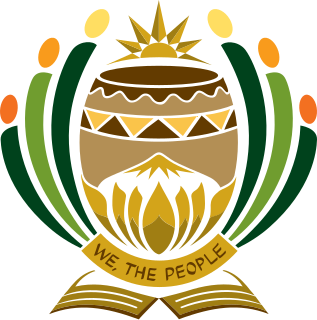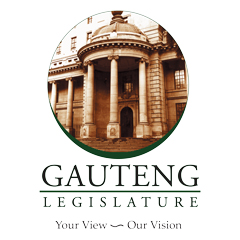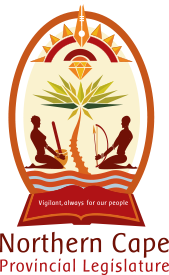The Republic of South Africa is a parliamentary representative democratic republic. The President of South Africa serves both as head of state and as head of government. The President is elected by the National Assembly and must retain the confidence of the Assembly in order to remain in office. South Africans also elect provincial legislatures which govern each of the country's nine provinces.

The Parliament of the Republic of South Africa is South Africa's legislature; under the present Constitution of South Africa, the bicameral Parliament comprises a National Assembly and a National Council of Provinces. The current twenty-seventh Parliament was first convened on 22 May 2019.

The Constitution of South Africa is the supreme law of the Republic of South Africa. It provides the legal foundation for the existence of the republic, it sets out the rights and duties of its citizens, and defines the structure of the Government. The current constitution, the country's fifth, was drawn up by the Parliament elected in 1994 in the South African general election, 1994. It was promulgated by President Nelson Mandela on 18 December 1996 and came into effect on 4 February 1997, replacing the Interim Constitution of 1993. The first constitution was enacted by the South Africa Act 1909, the longest-lasting to date. Since 1961, the constitutions have promulgated a republican form of government.

General elections were held in South Africa on Wednesday, 14 April 2004. The African National Congress (ANC) of President Thabo Mbeki, which came to power after the end of the apartheid system in 1994, was re-elected with an increased majority.

The National Council of Provinces (NCOP) is the upper house of the Parliament of South Africa under the (post-apartheid) constitution which came into full effect in 1997. It replaced the former Senate, but is very similar to that body, and to many other upper houses of legislatures throughout the world, in that its purpose is to represent the governments of the provinces, rather than directly representing the people.

The Parliament of Pakistan is the federal and supreme legislative body of Pakistan. It is a bicameral federal legislature that consists of the Senate as the upper house and the National Assembly as the lower house. According to the constitution of the Islamic Republic of Pakistan, the President of Pakistan is also a component of the Parliament. The National Assembly is elected for a five-year term on the basis of adult franchise and one-man one-vote. The tenure of a Member of the National Assembly is for the duration of the house, or sooner, in case the Member dies or resigns. The tenure of the National Assembly also comes to an end if dissolved on the advice of the Prime Minister or by the president in his discretion under the Constitution.
Floor crossing was a system introduced to the post-apartheid South African political system in 2002, under which members of Parliament, members of provincial legislatures and local government councillors could change political party and take their seats with them when they did so. Floor crossing in South Africa was abolished in January 2009.

The Western Cape Provincial Parliament (WCPP) is the legislature of the Western Cape province of South Africa. It is located at 7 Wale Street in Cape Town.
The 2003 floor crossing window period in South Africa was a period of 15 days, from 21 March to 4 April 2003, in which members of the National Assembly and the provincial legislatures were able to cross the floor from one political party to another without giving up their seats. The period was authorised by the passage of the Tenth Amendment of the Constitution of South Africa. The amendment scheduled regular window periods in the second and fourth September after each election, but the second and fourth Septembers after the 1999 election had already passed, so it included provision for a special window period starting fifteen days after the amendment came into effect.
In South Africa, a provincial legislature is the legislative branch of the government of a province. The provincial legislatures are unicameral and vary in size from 30 to 80 members, depending on the population of the province. Each legislature is chaired by a Speaker and a Deputy Speaker.

The Fourth Amendment of the Constitution of South Africa made two technical changes relating to the calling of provincial elections and the choice of delegates to the National Council of Provinces. It was enacted by the Parliament of South Africa, signed by Acting President Thabo Mbeki on 17 March 1999, and came into force two days later. It was signed and came into force simultaneously with the Fifth Amendment; the two amendments were separated because the Fourth involved provincial matters and had to be passed by the National Council of Provinces while the Fifth did not.
The 2005 floor crossing window period in South Africa was a period of 15 days, from 1 to 15 September 2005, in which members of the National Assembly and the provincial legislatures were able to cross the floor from one political party to another without giving up their seats. The period was authorised by the Tenth Amendment of the Constitution of South Africa, which scheduled regular window periods in the second and fourth September after each election. The previous general election had been held on 14 April 2004.

The Gauteng Provincial Legislature is the legislature of the South African province of Gauteng. It is a unicameral body of 73 members elected every five years. The current legislature, the sixth, was elected on 8 May 2019 and has an African National Congress majority of 37 members. The legislature is housed in Johannesburg City Hall in central Johannesburg.

The Eighth Amendment of the Constitution of South Africa allowed members of municipal councils to cross the floor from one political party to another without losing their seats. It came into force on 20 June 2002, and was effectively repealed on 17 April 2009 by the Fifteenth Amendment.

The Ninth Amendment of the Constitution of South Africa modified the scheme for the allocation of seats in the National Council of Provinces, to account for the possibility of changes in the party makeup of provincial legislatures. This was necessary because of other legislation which had been introduced to allow members of the provincial legislatures to cross the floor without losing their seats. It came into force on 20 June 2002, and was effectively repealed on 17 April 2009 by the Fourteenth Amendment.

The Tenth Amendment of the Constitution of South Africa altered the provisions relating to membership of the National Assembly and the provincial legislatures, to allow members of those bodies to cross the floor at certain times without losing their seats. It came into force on 20 March 2003, and was effectively repealed on 17 March 2009 by the Fourteenth and Fifteenth Amendments.

The Fourteenth Amendment of the Constitution of South Africa repealed some of the provisions inserted into the Constitution by the Ninth and Tenth Amendments which allowed for floor-crossing, that is, allowed members of legislative bodies to move from one political party to another without losing their seats. The remaining floor-crossing provisions were repealed by the Fifteenth Amendment, which was enacted at the same time.

The Fifteenth Amendment of the Constitution of South Africa repealed some of the provisions inserted into the Constitution by the Eighth and Tenth Amendments which allowed for floor-crossing, that is, allowed members of legislative bodies to move from one political party to another without losing their seats. The remaining floor-crossing provisions were repealed by the Fourteenth Amendment, which was enacted at the same time.

The Northern Cape Provincial Legislature is the legislature of the Northern Cape province of South Africa. It is a unicameral body of 30 members elected every five years. The current legislature was elected on 8 May 2019 and has an African National Congress majority of 18 members. It is situated in Kimberley, in a newly built complex to the west of the city centre on the edge of Galeshewe.
Jack Bloom is a South African politician who has been a Member of the Gauteng Provincial Legislature since 1994, representing the Democratic Party from 1994 until 2003 and the Democratic Alliance from 2003 onwards. Bloom is the DA's shadow MEC for health. Bloom was the DA caucus leader and the Leader of the Opposition in the provincial legislature from December 2007 to April 2009 and again from March 2011 until May 2014.







